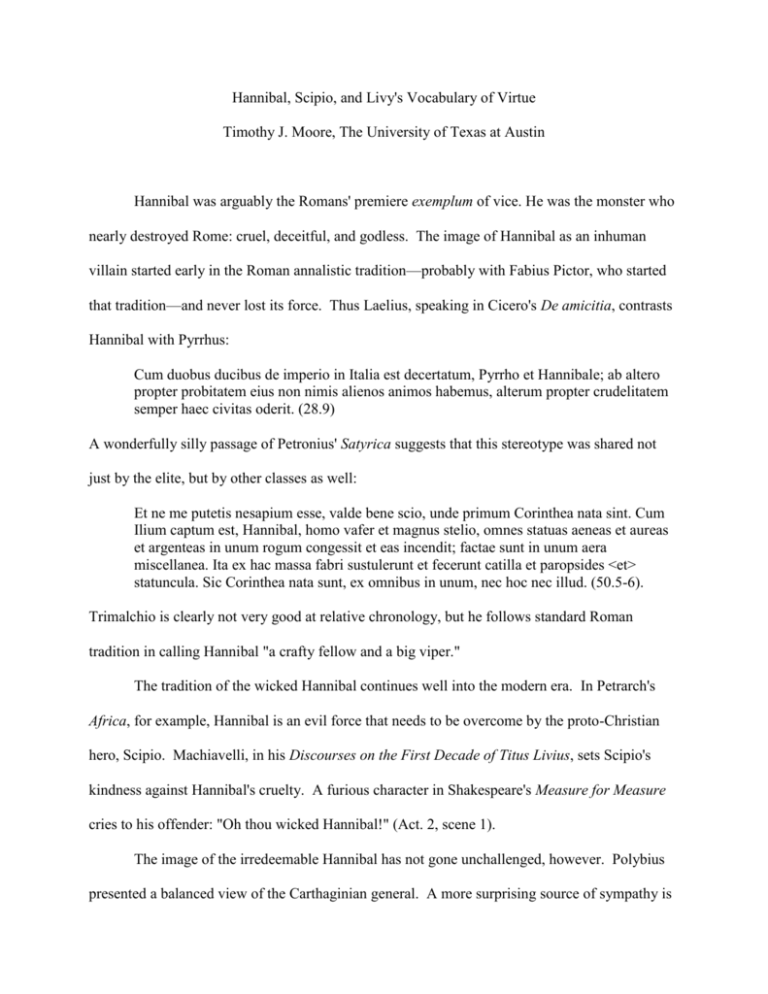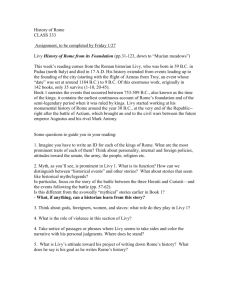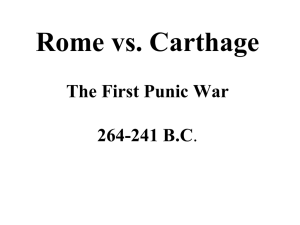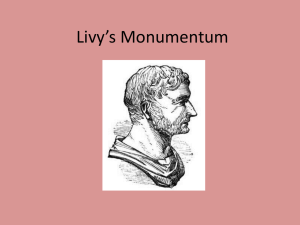Hannibal, Scipio, and the Vocabulary of Virtue
advertisement

Hannibal, Scipio, and Livy's Vocabulary of Virtue Timothy J. Moore, The University of Texas at Austin Hannibal was arguably the Romans' premiere exemplum of vice. He was the monster who nearly destroyed Rome: cruel, deceitful, and godless. The image of Hannibal as an inhuman villain started early in the Roman annalistic tradition—probably with Fabius Pictor, who started that tradition—and never lost its force. Thus Laelius, speaking in Cicero's De amicitia, contrasts Hannibal with Pyrrhus: Cum duobus ducibus de imperio in Italia est decertatum, Pyrrho et Hannibale; ab altero propter probitatem eius non nimis alienos animos habemus, alterum propter crudelitatem semper haec civitas oderit. (28.9) A wonderfully silly passage of Petronius' Satyrica suggests that this stereotype was shared not just by the elite, but by other classes as well: Et ne me putetis nesapium esse, valde bene scio, unde primum Corinthea nata sint. Cum Ilium captum est, Hannibal, homo vafer et magnus stelio, omnes statuas aeneas et aureas et argenteas in unum rogum congessit et eas incendit; factae sunt in unum aera miscellanea. Ita ex hac massa fabri sustulerunt et fecerunt catilla et paropsides <et> statuncula. Sic Corinthea nata sunt, ex omnibus in unum, nec hoc nec illud. (50.5-6). Trimalchio is clearly not very good at relative chronology, but he follows standard Roman tradition in calling Hannibal "a crafty fellow and a big viper." The tradition of the wicked Hannibal continues well into the modern era. In Petrarch's Africa, for example, Hannibal is an evil force that needs to be overcome by the proto-Christian hero, Scipio. Machiavelli, in his Discourses on the First Decade of Titus Livius, sets Scipio's kindness against Hannibal's cruelty. A furious character in Shakespeare's Measure for Measure cries to his offender: "Oh thou wicked Hannibal!" (Act. 2, scene 1). The image of the irredeemable Hannibal has not gone unchallenged, however. Polybius presented a balanced view of the Carthaginian general. A more surprising source of sympathy is Hannibal, Scipio, and Livy's Vocabulary of Virtue 2 Cornelius Nepos. In his biography of Hannibal, Nepos exaggerates Hannibal's military successes, stresses his prudentia, and says nothing about cruelty or perfidy. The "pro-Hannibal" view reached its peak, perhaps, under the African emperor Septimius Severus, who had a great monument constructed at Hannibal's burial place. This favorable view of Hannibal has also won adherents in the modern world: indeed it has dominated in the last two centuries. In the first half of the nineteenth century Hannibal found champions in two very different quarters. Napoleon praised “the intrepidity, confidence, and grandeur of all his enterprises.” And Barthold Niebuhr, whose History of Rome laid the foundations for the modern discipline of Roman history, idolized Hannibal as the greatest general of antiquity. In the twentieth and twenty-first centuries Hannibal has become a hero to many, including North American Afrocentrists, Tunisian patriots, and the authors and directors of a number of novels and films. And what of Livy? Livy scarcely shares the favorable views of Polybius and Nepos, let alone the adulation of Septimius Severus or Niebuhr. But his view of Hannibal is not completely one-sided. Though he is not shy about noting the Carthaginian's vices, he also recognizes his virtues. Often these virtues are not explicitly expressed, but become apparent through Hannibal's words and actions, and their effect on others. This is the indirect method of characterization for which Livy is well known. Elsewhere, however, Livy or one of his characters explicitly attributes a virtue or its lack to Hannibal. The first column of table 1 (at the end of this paper) lists each passage where Livy uses of Hannibal any one out of a set of 50 virtue-words I have studied, along with their opposites beginning with in. Hannibal also makes use of the vocabulary of virtue himself, both in direct speeches and in passages reporting his words or thoughts indirectly: that's the second column on the table. These virtue-words were enormously important to the Romans: they pervade their philosophical and moral treatises and their political propaganda, as well as the Hannibal, Scipio, and Livy's Vocabulary of Virtue 3 genres of history and biography. By examining what virtues Livy associates with Hannibal, therefore, we can learn much not only about the historian's view of Rome's archenemy, but also about his political and moral thought in general. Studying Hannibal's virtues alone, however, only takes us so far. We get a much richer view if we consider those virtues in comparison with those of others. And the obvious choice for comparison is Scipio Africanus. Hannibal and Scipio are natural foils to each other: the greatest Carthaginian general, who started the Second Punic War, and the greatest Roman general, who ended it. Building on this inherent parallelism between the two men, Livy took great pains to emphasize their similarities. Livy's third decade is clearly divided into a "Hannibal half" and a "Scipio half." Hannibal dominates books 21 through 25, which describe the events leading up to Cannae and then the battle's repercussions. In the early chapters of book 26, just as Hannibal reaches his zenith with his march on Rome, Scipio is elected to take over the Roman command in Spain, and he will dominate the decade's second half until his victory and triumph at the end of Book 30. The decade ends when the two generals finally meet, first in conference, then on the battlefield. Livy draws great attention to the fact that both Hannibal and Scipio continue the legacy of their fathers. He begins the third decade with Hannibal's oath to his father to oppose Rome, and near the end of his life Hannibal recounts the oath again to Antiochus (35.19). To counter this, Livy includes a probably apocryphal story that Scipio rescued his father at the battle at the Ticinus, the first major battle of the war; and characters refer repeatedly to Scipio's military feats as a continuation of the work of his father and uncle, and as an act of vengeance for their deaths at the hands of the Carthaginians. In the case of both men Livy pays much attention to their conflicts with their fellow citizens. Livy suggests that Hannibal was insufficiently supported from the homeland during the Hannibal, Scipio, and Livy's Vocabulary of Virtue 4 war, and he describes the political infighting leading to his self-imposed exile. In the case of Scipio, we read of a dispute within the senate as to whether he should cross to Africa and later learn in great detail of the accusations and trials that led to his self-imposed exile. Livy encourages us, then, to measure Hannibal and Scipio against each other. Hence the third and fourth columns in table 1: terms of praise attributed to and used by Scipio. In what follows, I will examine how Livy juxtaposes Hannibal and Scipio in terms of these virtue words. I will note first how Livy's vocabulary of virtue itself contributes to the parallelism between the two men. I will then examine how within this emphatic parallelism the terms for virtue and their context distinguish the two leaders: not surprisingly, the Roman Scipio generally comes out looking better when the two men are compared. Nevertheless, Livy's Hannibal and Scipio offer far more than just a simple dichotomy between evil and good; for Livy's presentation of the two men offers a number of complications and ironies. Sometimes the ironies suggest that Livy has simply put on patriotic blinders, refusing to acknowledge flaws in Scipio's character or virtues in Hannibal's. Livy's account is more than just propaganda, however, for the historian acknowledges moral ambiguities and uncertainties in the historiographical tradition he received. In several respects Livy reinforces the parallelism between Hannibal and Scipio through his use of virtue words. First, to both men Livy twice attributes the plural of virtus, virtutes. This would at first sight seem quite unremarkable: virtutes, after all, just means blandly, "virtues," or "good qualities." The plural of virtus, however, is rare in Livy. Though he uses the word virtus 297 times in the extant books, it only occurs 18 times in the plural; and of no other figures besides Hannibal and Scipio is the plural used more than once. Furthermore, the four uses of virtutes occur in parallel passages. Near the opening of the first half of the third decade, Livy breaks from his normal pattern of presenting his characters indirectly by listing directly Hannibal's virtutes and vitia. The description is placed within the context of Hannibal's first entry Hannibal, Scipio, and Livy's Vocabulary of Virtue 5 on the public stage, as Livy describes how he impressed his general and fellow soldiers after he joined his brother-in-law Hasdrubal in Spain as a young man: Itaque haud facile discerneres utrum imperatori an exercitui carior esset; neque Hasdrubal alium quemquam praeficere malle ubi quid fortiter ac strenue agendum esset, neque milites alio duce plus confidere aut audere. Plurimum audaciae ad pericula capessenda, plurimum consilii inter ipsa pericula erat. Nullo labore aut corpus fatigari aut animus uinci poterat. Caloris ac frigoris patientia par; cibi potionisque desiderio naturali, non uoluptate modus finitus; uigiliarum somnique nec die nec nocte discriminata tempora; id quod gerendis rebus superesset quieti datum; ea neque molli strato neque silentio accersita; multi saepe militari sagulo opertum humi iacentem inter custodias stationesque militum conspexerunt. Vestitus nihil inter aequales excellens: arma atque equi conspiciebantur. Equitum peditumque idem longe primus erat; princeps in proelium ibat, ultimus conserto proelio excedebat. Has tantas uiri uirtutes ingentia uitia aequabant, inhumana crudelitas, perfidia plus quam Punica, nihil ueri, nihil sancti, nullus deum metus, nullum ius iurandum, nulla religio. Cum hac indole uirtutum atque uitiorum triennio sub Hasdrubale imperatore meruit, nulla re quae agenda uidendaque magno futuro duci esset praetermissa. (21.4.3-9) Near the opening of the second half of the decade Livy uses another direct characterization, as he describes Scipio's skill at making his virtutes known and his confidence in those virtutes. Again, the passage comes at Scipio's entrance onto the public stage, his speeches after his election to the post left in Spain with the deaths of his father and uncle, and again it is in the context of the impressions the leader makes on those around him: Quam ubi ab re tanto impetu acta sollicitudinem curamque hominum animaduertit, aduocata contione ita de aetate sua imperioque mandato et bello quod gerundum esset magno elatoque animo disseruit, ut ardorem eum qui resederat excitaret rursus nouaretque et impleret homines certioris spei quam quantam fides promissi humani aut ratio ex fiducia rerum subicere solet. Fuit enim Scipio non ueris tantum uirtutibus mirabilis, sed arte quoque quadam ab iuuenta in ostentationem earum compositus, pleraque apud multitudinem aut per nocturnas uisa species aut uelut diuinitus mente monita agens, siue et ipse capti quadam superstitione animi, siue ut imperia consiliaque uelut sorte oraculi missa sine cunctatione exsequerentur. Ad hoc iam inde ab initio praeparans animos, ex quo togam uirilem sumpsit nullo die prius ullam publicam priuatamque rem egit quam in Capitolium iret ingressusque aedem consideret et plerumque solus in secreto ibi tempus tereret. Hic mos per omnem uitam seruatus seu consulto seu temere uolgatae opinioni fidem apud quosdam fecit stirpis eum diuinae uirum esse, rettulitque famam in Alexandro magno prius uolgatam, et uanitate et fabula parem, anguis immanis concubitu conceptum, et in cubiculo matris eius uisam persaepe prodigii eius speciem interuentuque hominum euolutam repente atque ex oculis elapsam. His miraculis nunquam ab ipso elusa fides est; quin potius aucta arte quadam nec abnuendi tale quicquam nec palam adfirmandi. Multa Hannibal, Scipio, and Livy's Vocabulary of Virtue 6 alia eiusdem generis, alia uera, alia adsimulata, admirationis humanae in eo iuuene excesserant modum; quibus freta tunc ciuitas aetati haudquaquam maturae tantam rerum molem tantumque imperium permisit.... Inde sequi nauibus iussis Tarraconem pedibus profectus conuentum omnium sociorum— etenim legationes ad famam eius ex omni se prouincia effuderant—habuit. naues ibi subduci iussit, remissis quattuor triremibus Massiliensium quae officii causa ab domo prosecutae fuerant. Responsa inde legationibus suspensis uarietate tot casuum dare coepit, ita elato ab ingenti uirtutum suarum fiducia animo ut nullum ferox uerbum excideret ingensque omnibus quae diceret cum maiestas inesset tum fides. (26.19.1-9, 12-14) Hannibal and Scipio are joined still more conspicuously through Livy's use of the singular virtus. Livy ascribes virtus to Hannibal and Scipio more than to any other individual, and they use it most often in their speeches. This is in itself not surprising: virtus, is, after all, Latin's premiere word for military excellence, and Hannibal and Scipio are the military leaders with the largest roles to play in Livy's work. Again, however, a significant parallel becomes apparent as we look at the context of the words. Clusters of the word virtus occur at 21.43, where Hannibal uses the word three times, and at 26.41, where Scipio uses it four times. These clusters appear in speeches the generals address to their troops at parallel points in the narrative: Hannibal's speech before the first major battle of the war at the river Ticinus, and Scipio's speech to his troops upon his first arrival in Spain. The words audacia and audax, though used less often than virtus, also emphasize parallels between the two men. Before the war's first major battle P. Scipio senior admires Hannibal's audacia in crossing the Alps (21.39.9). Before the last battle at Zama, Hannibal himself praises Scipio for undertaking all his deeds audacissime (30.30.12). Also conspicuous is the abundance of the words benignitas, benignus, and benigne in connection with both men. This may surprise, given Hannibal's reputation for cruelty. The frequent references to benignitas reflect the common strategies of the two leaders. The keystone of Hannibal's strategy was his attempt to wrench Rome's Italian allies away from their overlords, and as Livy presents it the core element of this attempt was his kindness towards allies whom he Hannibal, Scipio, and Livy's Vocabulary of Virtue 7 had captured in battle. Scipio was in a similar situation in Spain, where he sought to win over the Spanish tribes, and later Numidians as well, who were subject to or allied with the Carthaginians. It is with benignitas, however, that we see most clearly how Livy uses both the ScipioHannibal parallelism and his language of praise to reinforce negative elements in his characterization of Hannibal. For every time Hannibal shows benignitas, the word is undermined or made ironic by its context. Hannibal first shows benignitas when he reponds benigne to the ambassadors of Alpine tribes who promise him safe passage. The benignitas is a façade, however, for he does not trust the ambassadors. The Alpine leaders were in fact deceiving him, and Livy writes that Hannibal was almost destroyed by them, "non bello aperto sed suis artibus, fraude et insidiis" (21.34.4). The next group Hannibal addresses benigne is a contingent of Gallic horsemen who deserted from the Romans, killing some guards on their way (21.48.2). He promises them great gifts and sends them home to entice their people to join the Carthaginian cause. After Cannae, Hannibal addresses the captured allies benigne and sends them home without a ransom (22.58.2). Instead of presenting this as an act of true kindness, however, Livy describes it as a sign of hubris and shortsightedness: "Hannibal secundum tam prosperam... pugnam victoris magis quam bellum gerentis intentus curis." When we next see an allegedly benignus Hannibal, he has succeeded in winning over one of Rome's allies, the city of Capua. When he first addresses the city's senate, he begins with an oratio perblanda ac benigna (23.10.1). Soon, however, he changes tone and demands that the senators hand over to him Decius Magius, a leading citizen who had opposed the city's transfer of allegiance. L. Bantius, a soldier of Nola, was found, cared for benigne, and sent home with gifts after Cannae (23.15.8). The action, of course, was specifically so that he would entice the Nolani to Hannibal, Scipio, and Livy's Vocabulary of Virtue 8 rebel against Rome, and the Roman general Marcellus successfully combats Hannibal's effort with benignitas of his own towards Bantius. The highest praise for Hannibal's benignitas comes from ambassadors of the Hirpini and the Samnites: Tua nos non magis uirtus fortunaque quam unica comitas ac benignitas erga ciues nostros quos captos nobis remisisti ita conciliauit tibi ut te saluo atque incolumi amico non modo populum Romanum sed ne deos quidem iratos, si fas est dici, timeremus. (23.42.4). The high praise is only a preface to a complaint: Hannibal has failed to protect his new allies from the incursions of the Roman army under Marcellus. Finally, Hannibal is said to address the Tarentini benigne in an assembly after he has taken the city through stealth (25.10.8). The content of his speech, however, is far from benignus. He orders the people to mark their names on their doors: any door not marked will be assumed to belong to a Roman or Roman sympathizer and will be pillaged. Contrast these passages with Scipio's benignitas after his capture of New Carthage in Spain. This is the first success of Scipio's campaign, so his behavior here has paradigmatic significance. Kept in New Carthage were the Carthaginians' Spanish hostages. After assuring them that they have fallen into the hands of a people who prefers to tie people to itself beneficio rather than metu, and to have foreign peoples joined through fides and societas rather than triste servitium, Scipio sends messengers to summon people to bring the hostages home. Those who had to wait to be brought home he entrusts to the quaestor Gaius Flaminius, whom he charges to watch over them benigne (26.49.10). This reference to benignitas leads not, as so many of the Hannibal references do, to a contradiction or a reminder of how self-serving it is, but rather to the story of the wife of the Spanish aristocrat Mandonius. A hostage herself, she pleads that the younger female hostages be kept safe from sexual injury, in response to which he reassures her in lofty language about sanctitas, virtus, dignitas, and decus matronale, after which he hands the Hannibal, Scipio, and Livy's Vocabulary of Virtue 9 women over to a man of spectata integritas and orders that they be guarded as verecunde and modeste as if they were the wives and mothers of their own guest-friends. Nor is this all. In the next chapter Scipio sends back to her fiancé a remarkably beautiful Spanish prisoner, after another fine speech to the young man. The fiancé's response again praises Scipio benignitas: His laetus donis honoribusque dimissus domum, impleuit populares laudibus meritis Scipionis: uenisse dis simillimum iuuenem, uincentem omnia cum armis, tum benignitate ac beneficiis (26.50.13). We find similar contrasts when we look at the other virtues associated with kindness and mercy. Hannibal shows lenitas only as simulata lenitas when he refrains from pillaging the land around Tarentum in the hopes the city will go over to him (24.20.15). Scipio's lenitas is clearly sincere when he decides to treat leniter his troops who have mutinied (28.25.9 and 28.26.3) and when, after Masinissa has given poison to Sophoniba, he chastises the Numidian king leniter (30.15.10). By the time Livy wrote his third decade, clementia had become a cardinal virtue of Augustus. No surprise, then, that we see it associated with the Roman hero Scipio four times. Just as Scipio provided a double exemplum of benignitas when he dealt with those captured at New Carthage, he shows clementia in two separate realms within short succession later in the Spanish campaign. When Scipio becomes seriously ill, and rumors fly that he has died, his own troops mutiny over delayed pay, and the Spanish king Indibilis rebels. Both rely upon Scipio's clementia when he recovers (28.25.13, 28.34.6). And both receive clementia: Scipio pardons all but the ringleaders of the mutiny, and he receives Indibilis back into a Roman alliance. Clementia for Livy's Hannibal, on the other hand, is an entirely self-serving affair. When, early in the Italian campaign, the village of Clastidium is handed over to him, he spares the captured members of the Roman garrison, ut fama clementiae in principio rerum colligeretur (21.48.10). Hannibal, Scipio, and Livy's Vocabulary of Virtue 10 Indulgentia, though it was later to become a major imperial virtue, still retained in Livy's day potential negative nuances, for it often suggested indulgence to one who did not deserve indulgence. Thus when Hanno uses it of his leader as he tries to win some Italian allies of Rome over to the Carthaginian side, he inadvertently undermines his argument (23.43.11). Livy never uses the word of Scipio. In this context, the distribution of the word mitis on table 1 may at first sight first sight seem surprising: used three times of Hannibal, never of Scipio. The first two attributions of the term to Hannibal come in connection with the aftermath of Cannae, as Livy spares his Roman captives and asks for ransom. Livy stresses the uniqueness of the event and the attitude it suggests: "Romanos quoque uocatos, quod nunquam alias antea, satis miti sermone adloquitur" (22.58.2). Later, when one of the captured soldiers pleads with the senate to pay the ransom, he reinforces the message that it is astonishing for Hannibal to be mitis: he says that the Carthaginian general was in nos mitis... contra naturam suam (22.59.17). These passages add extra irony when, a few chapters later, Livy uses mitis in yet another passage where Hannibal shows a façade of gentleness to win allies. After successfully besieging Nuceria, Hannibal spares most of the inhabitants: Deinde ut qui a principio mitis omnibus Italicis praeter Romanos uideri uellet, praemia atque honores qui remanserint ac militare secum uoluissent proposuit. Nec ea spe quemquam tenuit; dilapsi omnes (23.15.4). Words of justice and loyalty also distinguish the two men to Hannibal's disadvantage. On a number of occasions Hannibal justifies his actions, pointing to what he sees as the Romans' theft of Sardinia and Sicily, and the Romans' cruelty and arrogance in general (e.g., 21.43). Nowhere, however, does he use the words iustitia or iustus. Scipio, on the other hand, when the Carthaginians sue for peace before Hannibal returns to Africa, says that he will agree to peace even though victory is within his grasp, "ut omnes gentes sciant populum Romanum et suscipere Hannibal, Scipio, and Livy's Vocabulary of Virtue 11 iuste bella et finire" (30.16.9). And in his conference with Hannibal before Zama, he claims that the Romans took up "pia ac iusta...arma" at the beginning of both the first and second Punic wars, defending their allies (30.31.4). Reference to pia arma leads us to pietas, one of the three virtues, along with virtus and fides, in which the Romans tended to think they most excelled. Pietas, of course, is not just piety in our sense, but is loyalty to all that one should most revere: the gods, the state, and one's family. One could argue that Hannibal's entire career was a product of pietas in all three of its aspects. Driven by the oath he took on an altar, in response to the command of his father, he fought on behalf of his fatherland. Livy never credits Hannibal with pietas, however; and while he never questions Hannibal's loyalty to his father and his legacy, he sometimes suggests that he acted for his own interests against those of the state; and in the description of Hannibal's character quoted above, he baldly states that Hannibal was a man with nullus deum metus and nulla religio (21.4.9). The only time Livy's Hannibal himself uses the word pietas is when he is describing Scipio. He tells the Roman general before Zama, "patris et patrui persecutus mortem ex calamitate uestrae domus decus insigne uirtutis pietatisque eximiae cepisti" (30.30.13). Scipio thus becomes even in the mouth of his enemy a paradigm of pietas. The association is reinforced elsewhere as Scipio is said, when he tried to prevent the arrest of his brother, to have acted magis pie quam civiliter (38.56.9), and when he himself uses the word not only to describe Rome's pia bella in the passage cited above, but also to praise his soldiers (26.41.4) and to cite as an exemplum the privata pietas of Coriolanus (28.29.1). In several respects, then, Livy's vocabulary of virtue in fact points out Hannibal's vices, especially in contrast to Scipio. In other respects, however, the difference in virtue vocabulary suggests not so much that Hannibal is evil, but that his virtues are more limited and focused than Hannibal, Scipio, and Livy's Vocabulary of Virtue 12 those of his Roman counterpart. This distinction becomes clear if we examine in more detail the parallel passages cited above where Livy discusses the two men's virtutes. In the description of Hannibal's good qualities at 21.4 we find the virtues of a soldier and a leader of soldiers: Hannibal leads in deeds that need to be done fortiter ac strenue: this is the adverbial equivalent of virtus in its most restricted sense of military virtue. He combines audacia and consilium, a standard Livian formula for the mixture of daring and good sense essential in a general. He shows a soldier's toughness in his stamina, his endurance of heat and cold, his moderation in eating and drinking, his ability to sleep little and without creature comforts, and his disdain for fine clothing. The list of virtues concludes with the premier soldierly virtue, courage on the field of battle. The discussion of Scipio's virtutes at 26.19 is quite different. Scipio's military virtues are taken for granted, and we learn instead of his ability to impress and win over civilians, first the Roman populace, and then delegations from Rome's allies. The pattern set by these two passages continues throughout Livy's narrative. Hannibal is an astoundingly competent soldier and military leader, but his virtues do not go beyond that realm. Scipio, Livy suggests, is much more well rounded in his virtues. Hannibal, for example, is described early on as an acerrimus dux (21.16.5). Acer, with its suggestion of fierce energy, is usually very positive, but also very focused, almost always describing the energy shown in battle. Livy uses it of a number of Hannibal's Roman enemies, including G. Claudius Nero, Marcellus, and Fulvius Flaccus; but he never uses it of Scipio. Impiger has similar connotations connecting it especially with soldiers, and it too is used of Hannibal but never of Scipio (27.44.6). Hannibal is even once incautus (21.7.10): this seems surprising in one who is so well known for strategy and who elsewhere catches other generals when they are incauti. But in fact it reflects further Hannibal's soldierly qualities: he is wounded when, leading his men against Saguntum, he approaches the besieged wall incautius. Hannibal is credited with prudentia when he is advising Hannibal, Scipio, and Livy's Vocabulary of Virtue 13 Antiochus on his war with the Romans (36.15.2), and he respects the prudentia of his opponent Fabius Maximus (22.12.16); but he must excuse himself for his imprudentia de pace (30.37.10) when he rashly pulls from the podium a speaker foolishly opposing peace after Zama. Scipio shows virtues in a number of realms where we never get to see Hannibal in action. Both men, for example, show comitas. But for Hannibal the virtue is only another example of how he is kind to captives so that they will become allies (23.42.2, 24.13.1). Scipio's comitas, along with his dexteritas, wins over even the Carthaginian general Hasdrubal when the two join the Numidian Syphax for a dinner party (28.16.6). Aside from the fact that he had a Spanish wife (24.41.7), we learn nothing about Hannibal’s sex life; but Scipio, in his treatment of the women captured at New Carthage, and again when he admonishes Masinissa to end his marriage with Sophoniba, becomes an exemplum of continentia and temperantia (30.14.5); and he is the only speaker in Livy to extend the words virtus and modestia into the realm of sexuality (26.48.15, 26.49.16). Perhaps the most conspicuous difference between how Livy praises Hannibal and the virtues he attributes to Scipio lies in his use of magnitudo animi. Magnitudo animi is a highminded indifference to what is unimportant, accompanied by a determination to accomplish, and confidence that one can in fact accomplish, what is important. Scipio is his foremost exemplum of the virtue. He shows it when he addresses the people before he first departs for Spain in the passage cited above, speaking "ita... magno elatoque animo" that all are certain he will accomplish his goals (26.19.1). That same magnitudo animi impresses his new Spanish allies when he rejects the name of king (27.19.6), leads him to want to add victory in Africa to his successes in Spain (28.17.2), and causes him to refuse excessive honors after his triumph over Hannibal (38.57.1). Rome's enemy, king Antiochus, thinks Scipio will be open to his peace proposals because of his magnitudo animi and satietas gloriae (37.34.3). And Livy credits Hannibal, Scipio, and Livy's Vocabulary of Virtue 14 Scipio's magnitudo animi with his refusal to stand trial when his political enemies accuse him of peculation (38.52.2). Hannibal is never credited with magnitudo animi, nor does the virtue appear to be part of his worldview. When he uses the term maior animus, he does not refer to the high-mindedness of magnitudo animi, but merely intensifies the soldierly virtue of animus, meaning boldness and zeal (21.44.3). This distinction is in keeping with Livy's general presentation of magnitudo animi as a virtue peculiarly Roman, and far removed from what he sees as Carthaginian. The only nonRomans Livy credits with magnitudo animi are Rome's staunch allies Masinissa (29.31.2) and Attalus I of Pergamum (31.21.3); and after Cannae, Livy contrasts the magnitudo animi of the Romans with the Carthaginians, who gave up after their own military disasters. As Hannibal and Scipio act as foils to each other, then, the Roman repeatedly comes out ahead. When we start to look more closely at Livy's narrative, however, the simple dichotomy of good Scipio versus bad Hannibal starts to break down. Let's examine, for example, how the two men are associated with the third of the Roman trilogy of cardinal virtues, fides. This one should be easy: Livy says quite explicitly near the end of the passage cited above that Hannibal's vices included perfidia plus quam Punica, nihil veri, and nullum ius iurandum (21.4.9); and Scipio, as we have seen, tells the Spanish hostages that Rome joins her allies to her with fides rather than servitium (26.49.8). But in fact things get more complicated as we look at Livy's use of the words fides, fidelis, and infidelis, and his description of the two men's actions. It is challenging to track the use of fides because the word is so varied in its nuances. It can be used of most anything that contributes to a relationship of trust, and can therefore range from the most mechanical senses, in formulas like deditio in fidem, to the most praiseworthy, in its meanings of loyalty, trustworthiness, and conscientiousness. If we look at the passages where fides is most clearly used to designate a moral quality, we find some surprises. Hannibal is Hannibal, Scipio, and Livy's Vocabulary of Virtue 15 credited with such fides three times. After the sack of Cartala in Spain, Livy writes, Hannibal distributed the booty and paid his soldiers cum fide (21.5.5). When he took Casilinum he returned the ransomed captives summa cum fide. Livy rejects an alternate version saying that the captives were killed (23.19.6). Much later, when Hannibal's predictions to King Antiochus have proven completely correct, Livy writes that to Antiochus Hannibal seemed the only advisor who foresaw the truth and predicted it fideliter (36.41.6). These are all cases, of course, where fides is in Hannibal's own interest. Livy writes explicitly that Hannibal's fides in paying his soldiers and distributing booty won them over for his ensuing campaign against Saguntum. Most of the soldiers ransomed at Casilinum are Roman allies, the group Hannibal so wanted to entice to his side. His advice to Antiochus serves his own aim to continue to the death his personal war against Rome. Nevertheless, we do see here a Hannibal who, at least sometimes, can be trusted: a more complicated figure than the man of perfidia plus quam Punica. It might be argued that these fleeting glimpses of Hannibal's fides are completely overwhelmed by the places where Livy demonstrates Hannibal's famous trickery in battle. Perhaps, but it is worthwhile in this connection to consider Scipio's fides. He is credited with fides a number of times. But his first major military success in Africa is a piece of trickery similar to what we see Hannibal doing elsewhere. He engages in peace negotiations with the Carthaginians, but accompanying the negotiators are spies, learning the layout of the Carthaginian and Numidian camps. Scipio then attacks the camps by night and burns them. Livy exonerates Scipio to a certain extant: he includes in his account a report not found in Polybius that shortly before the attack the Carthaginians had included unjust demands, which gave Scipio the excuse to end the truce (30.4.; cf. Polybius 14.2). Scipio’s actions nevertheless complicate our sense of his fides (30.3-6). Hannibal, Scipio, and Livy's Vocabulary of Virtue 16 Closely related to fides or its lack is the self-serving benignitas we noted above. If we look more closely at Scipio's acts of kindness to potential allies, are they in fact any less manipulative than Hannibal's? The overwhelmed fiancé of the Spanish captive who praises Scipio's benignitas brings him a large contingent of cavalry: Scipio wasn't being altruistic when he handed over his beloved. Sometimes we see in Scipio ironic benignitas similar to what we saw in Hannibal. When, during the war in Greece, Athenian ambassadors come to Scipio pleading for peace on behalf of the Aetolians, Scipio responds warmly: commemorantis multas gentes populosque in Hispania prius, deinde in Africa in fidem suam uenisse; in omnibus se maiora clementiae benignitatisque quam uirtutis bellicae monumenta reliquisse (37.6.6). This is about as lofty praise of benignitas as we can get; but we learn in the surrounding passage that Scipio is so merciful here for a reason: he wants to get the Aetolians out of the way so that he can go on and fight Antiochus (37.6.5). Two uses of benigno voltu are especially interesting in this context. Scipio orders his legati to receive the leaders of his troops' mutiny benigno voltu, but then get them drunk and capture them for execution (28.26.6). Later Scipio receives Masinissa benigno voltu after the Numidian king has defeated Syphax and then hastily married Syphax's wife Sophoniba. What follows is a speech in which Scipio makes clear to Masinissa that he cannot keep his new bride: Quos cum pariter ambo et benigno uoltu excepisset et egregiis laudibus frequenti praetorio celebrasset, abductum in secretum Masinissam sic adloquitur: “aliqua te existimo, Masinissa, intuentem in me bona et principio in Hispania ad iungendam mecum amicitiam uenisse et postea in Africa te ipsum spesque omnes tuas in fidem meam commisisse. Atqui nulla earum uirtus est propter quas tibi adpetendus uisus sim qua ego aeque ac temperantia et continentia libidinum gloriatus fuerim. Hanc te quoque ad ceteras tuas eximias uirtutes, Masinissa, adiecisse uelim.” (30.14.3-6) The use of benigno voltu, with it shades of kindness disguising severity, reminds us that in fact Scipio's entire speech to Masinissa, with its high language about continentia, temperantia, and Hannibal, Scipio, and Livy's Vocabulary of Virtue 17 the conquest of voluptates, is in the end really a command that Masinissa hand over his wife, whom Scipio fears will harm the interests of Rome (30.14.3). Returning to the list of vices Livy assigns to Hannibal in the passage listing his virtutes and vitia, we note the one for which he is probably most famous, inhumana crudelitas (21.4.9). Livy certainly shows Hannibal being cruel at several points in his narrative, but there is surprisingly little in Livy's account to support the charge that Hannibal was exceptional in this realm, especially when one compares him with his Roman opponents. Scipio, allegedly the paradigm of clementia and magnitudo animi, once lets his soldiers murder all the inhabitants of a captured town (28.20.6), and he lets some of the hapless inhabitants of the Carthaginian camp be burned alive (30.5). Moving beyond Scipio to Rome in general, we do well to remember that it was a Roman consul, Claudius Nero, not a Carthaginian, who, after the defeat of Hannibal's brother Hasdrubal at the battle of the Metaurus, flung the Carthaginian general's dissevered head in front of Hannibal's camp to inform him that Hasdrubal had been defeated (27.51.11). The other vices listed at 21.4 involve religion: nullus deum metus, nulla religio. We noted above the contradiction between these accusations and Hannibal's life-long allegiance to an oath. At several points in the narrative we see Hannibal not only obeying this oath, but making vows and dedications, obeying divinely sent orders, and citing the gods as his vindicators: he clearly has some deum metus and religio. And Scipio? He refers to the gods repeatedly and is cited for his pietas. But Livy leaves open to doubt the sincerity of his religious pretensions. At 26.19 Livy reports that Scipio encouraged rumors that he had communion with, indeed that he was the son of, Jupiter. How much, Livy asks, are these actions only a façade to impress the superstitious? The dichotomy between evil Carthaginians, with Hannibal at their head, and good Romans, led by Scipio, thus does not work nearly as easily as Livy's initial characterization of Hannibal, Scipio, and Livy's Vocabulary of Virtue 18 Hannibal might encourage us to believe. This leads us to an essential question about how we are to respond to Livy's text. Do we simply have a case here of Livy trying unsuccessfully to mold history into his own set of ideological preconceptions, refusing to see beyond those preconceptions when the facts contradict them? If so, our primary task as critics and teachers is to deconstruct Livy's text, keeping always in mind that he sees history through rose-colored glasses. Or does Livy himself, aware of the problems in his dichotomy, embrace the moral ambiguities of history more than he is often given credit for? There can be no doubt that to a great extent Livy is simply unable or unwilling to see the moral complexities that surround the opposition between Carthaginians and Romans. He writes without question as a patriot. He takes such stereotypes as Punic perfidy for granted; and on many occasions he either shapes his narrative in such a way that Roman actions of questionable morality appear justified, or he simply does not see the immorality that we see in the deeds and words of his Roman heroes. Another aspect of Livy's ideology that has made him see history differently from how we might see it is his attitude towards sexuality. It is hard for us, I think, not to see an element of cynicism in Scipio's speech to Masinissa, in which he uses the concepts of continentia and temperantia as he pries his wife away from the Numidian king (30.14.3-6). This becomes especially evident when we note the report of Polybius that Scipio himself had a reputation as a lady's man (10.19.3). I don't think Livy saw a touch of irony in the passage. Throughout his narrative, from the tale of Lucretia through stories of rapes and threats of rape during Rome's wars in the East, Livy emphatically connects sexual morality with political and military success and failure. What may seem like priggishness to us is to Livy a bulwark of political as well as personal morality. Nevertheless, I think we can do more with Livy's text than just deconstruct it. As a number of recent studies have shown, Livy, in spite of his patriotic and sometimes naive Hannibal, Scipio, and Livy's Vocabulary of Virtue 19 approach, shows throughout the Ab urbe condita an awareness of the moral ambiguities and uncertainties of Roman history. Let me conclude by pointing out three ways in which Livy shows this awareness in his characterization of Hannibal and Scipio. One way is the casual attribution of a surprising virtue. When Hannibal was in the court of King Antiochus, Livy reports, the king became suspicious because Hannibal had had conversations with a Roman legatus, and he no longer invited him to meetings of his inner circle. In response Hannibal tells him about his oath to be always hostile to the Romans. Leading to the oath in Livy's account is the following set of clauses: deinde melius esse ratus et percunctari causam repentinae alienationis et purgare se, tempore apto quaesita simpliciter iracundiae causa auditaque (35.19.2). quaesita simpliciter iracundiae causa is an unpretentious ablative absolute, but quite striking in its use of simpliciter. Polybius, in his account of the same event, says nothing about Hannibal’s directness but has him make several arguments before coming to the oath story (3.11.3-4). Simplicitas is rare in Livy, used of people's actions or words only thirteen times. It suggests an innocence and frankness bordering on naiveté. That it should be used here of Hannibal, elsewhere the epitome of trickiness and faithlessness, suggests Livy's awareness that Hannibal is a more complex figure than the Roman tradition, and some of his own earlier descriptions, suggest. The next method Livy uses to show an awareness of moral complexity beneath the surface narrative is significant juxtaposition. As was noted, Livy attributes fides to Hannibal three times. The first such attribution, the report that Hannibal rewarded his soldiers cum fide after the fall of Cartala, comes immediately after Hannibal is said to have had perfidia plus quam Punica. By contradicting himself so soon, Livy deliberately encourages his reader to question the blanket assertion that Hannibal had no fides. Hannibal, Scipio, and Livy's Vocabulary of Virtue 20 Another significant juxtaposition, this time involving Scipio, comes in connection with one of Livy's most favorable assessments of Hannibal: Ac nescio an mirabilior aduersis quam secundis rebus fuerit, quippe qui cum in hostium terra per annos tredecim, tam procul ab domo, uaria fortuna bellum gereret, exercitu non suo ciuili sed mixto ex conluuione omnium gentium, quibus non lex, non mos, non lingua communis, alius habitus, alia uestis, alia arma, alii ritus, alia sacra, alii prope di essent, ita quodam uno uinculo copulauerit eos ut nulla nec inter ipsos nec aduersus ducem seditio exstiterit, cum et pecunia saepe in stipendium et commeatus in hostium agro deesset, quorum inopia priore Punico bello multa infanda inter duces militesque commissa fuerant (28.12.2-5). It is surely no coincidence that this high praise for Hannibal’s ability to prevent mutinies in spite of lack of resources comes only twelve chapters before Scipio is faced with a mutiny of his soldiers caused by insufficient payment (28.24). In this respect, Hannibal is superior not only to his Carthaginian predecessors, but also to the Roman hero of Livy's third decade. The third and most important method Livy uses to acknowledge moral complexity is the unreliable speaker. As we have noted, Livy preferred indirect to direct characterization: most of what we learn about his characters comes not from direct description, but from what characters do and say. Too often forgotten in assessments of Livy's method is the fact that such indirect characterization means the author often leaves moral judgment up to his reader. Actions need to be interpreted, and speakers can be wrong, especially when they are praising and blaming each other. Nowhere is this more evident than in the accusations that Hannibal is immitis. Immitis is worse that just not mitis. Livy uses the word only five times, each time suggesting extreme severity, harshness, or cruelty. Hannibal is the only character with whom the term is connected twice. Both times, however, the word is used by Hannibal's enemies. His political foes in Carthage, trying to bring about his downfall when he has gained an important role in Carthaginian domestic politics after the war, tell the Romans that Hannibal has an immitis et implacabilis animus (33.45.7). This is scarcely a reliable source, and Livy gives no credence to Hannibal, Scipio, and Livy's Vocabulary of Virtue 21 the enemies' accusation that Hannibal was plotting with Antiochus against the Romans before his exile from Carthage. The other accusation comes from the Roman consul Terentius Varro. After the Roman disaster at Cannae, Terentius, approached by ambassadors from Capua, tells them that they must now come to Rome's rescue against the bestial Punic hoard. His description of Hannibal's army includes the following passage: Hunc natura et moribus immitem ferumque insuper dux ipse efferauit, pontibus ac molibus ex humanorum corporum strue faciendis et, quod proloqui etiam piget, uesci corporibus humanis docendo. (23.5.12) Other sources suggest that there were authors who reported that Hannibal had his men build bridges out of corpses and eat human flesh, but Livy reports the stories only here. Is this, as some have suggested, a way for Livy to include such abominations without explicitly affirming the stories? I think not, for the speaker here is not just anyone, but Terentius Varro, the consul whose arrogant recklessness led to the defeat at Cannae and who, after fleeing from the battlefield, is now completely hysterical. Indeed, Livy blames Varro's frantic speech here in part for the defection of Capua that followed soon thereafter. By taking these stories from the historiographical tradition and putting them in Varro's mouth here, Livy engages in polemic against the excesses of that tradition. One of the bulwarks of Livy's approach to history is that history provides exempla of both good and evil. Hence the famous words of his preface: Hoc illud est praecipue in cognitione rerum salubre ac frugiferum, omnis te exempli documenta in inlustri posita monumento intueri; inde tibi tuaeque rei publicae quod imitere capias, inde foedum inceptu foedum exitu quod vites. (Praefatio 10) It is tempting to assume from this passage that Livy will present his history as a series of easy moral paradigms, with moral uncertainty removed in order to make clear what should be imitated and what avoided. And indeed, as our examination of Scipio and Hannibal has shown, Livy sometimes molds his narrative in such a way that moral questions become more black and white, Hannibal, Scipio, and Livy's Vocabulary of Virtue 22 especially when he is blinded by his own patriotism. Yet this is only part of the picture. We have in Hannibal and Scipio two men who could provide the easiest exempla in all of Rome's history. By the time Livy wrote Romans had been vilifying Hannibal and idolizing Scipio for two hundred years. Yet even here Livy leaves in evidence, and sometimes even calls attention to, uncertainties and contradictions in the apparently straightforward moral dichotomy between the two leaders. The message is clear. Exemplary history does not mean easy history. The difference between good and evil in history is not always self-evident. Even a Hannibal can provide us with qualities and actions to be imitated; and sometimes the actions even of a Scipio might be best avoided. Table 1 Virtue Attributed to Hannibal1 Acer Audacia 21.16.5 21.4.5, 21.39.9, 27.1.7 Benignitas 21.34.4, 21.48.2, 22.58.2, 23.10.1, 23.15.8, 23.42.4, 25.10.8 21.7.10 21.48.10 Incautus Clementia Used by Hannibal2 Attributed to Scipio Used by Scipio 21.44.3, 30.30.12 23.18.1 26.41.7, 30.30.12 26.41.7, 37.1.8 26.50.13, 28.2.14, 30.14.3, 37.6.6 26.49.10, 28.26.6, 37.6.6 28.25.13, 28.34.3, 28.34.6, 37.6.5, 37.6.6 28.18.6, 29.22.2 28.42.15, 30.28.11 37.6.6 30.14.5 28.18.6 30.14.5 27.1.6, 29.7.3 21.48.10 Comitas Consilium Constantia Continentia Dexteritas Diligentia Fides 23.42.2, 24.13.1 21.4.5, 27.1.7 26.12.13 (-) 21.5.5, 23.19.16, 36.41.6 21.44.2, 30.35.7 Infidelis Fortitudo 36.7.21 (-) 21.4.4 36.7.21 21.44.2, 1 2 25.11.16 26.41.25, 28.32.1, 28.34.3, 37.36.8 28.40.4, 28.40.8, (-) after a passage means Hannibal is said not to possess the quality. Passages written in bold are direct speech, other passages indirect discourse. 30.5.5 26.20.2, 26.41.25, 26.49.8, 28.44.4, 28.44.7, 29.8.2, 37.7.9, 37.36.8 26.41.23, Hannibal, Scipio, and Livy's Vocabulary of Virtue 21.44.3, 21.44.8 23.45.9, 30.30.17 Impiger Indulgentia Iustitia Iniustus 23 28.42.16 29.26.5, 38.54.8 28.44.11, 30.14.8 27.44.6 23.43.11 30.16.9, 30.31.4 28.29.1 Hannibal, Scipio, and Livy's Vocabulary of Virtue Virtue Lenitas Attributed to Hannibal 24.20.15 Used by Hannibal Magnitudo animi Magnus animus Mitis Immitis Moderatio Modestia Munificentia Patientia Pertinacia Pietas Providentia Improvidus Prudentia Imprudentia Sapientia Simplicitas Strenuus Temperantia Virtus Virtutes Attributed to Scipio 28.25.9, 28.26.3, 30.15.10 26.19.1, 27.19.6, 28.17.2 37.34.3, 38.52.2, 38.57.1 24 Used by Scipio 28.43.6 21.44.3 22.58.2, 22.59.17, 23.15.4 23.5.12, 33.45.7 23.15.4 38.56.11 28.44.18 24.20.10 (-) 21.4.6 26.12.1 (-), 26.38.1 (-) 36.15.2 30.37.10 22.39.20 35.19.2 21.4.4 22.29.2, 22.58.3, 23.42.4, 23.43.10, 30.35.10, 31.1.6, 35.43.1 21.4.9, 21.4.10 23.18.1 29.20.3 28.38.4 (-) 30.30.13 30.30.13, 38.56.9 21.53.7 22.12.16 30.37.10 28.40.4 30.14.5, 38.56.11 21.30.11, 26.41.25, 28.17.2, 21.43.6, 30.14.5 21.43.13, 30.28.11, 30.30.13, 21.43.17, 37.6.6 22.12.4, 22.58.3, 23.45.10, 30.30.13, 30.30.23 26.19.3, 26.19.14 26.49.16, 28.44.18 37.36.6 26.41.4, 28.29.1, 30.31.4 30.5.5 28.32.4 30.14.8 30.14.5, 30.14.7 26.41.5, 26.41.9, 26.41.12, 26.41.25, 26.48.13, 26.49.15, 27.18.8, 28.32.11, 28.43.19, 30.14.5, 37.6.6 30.14.6







